Keyword Research Secrets from SEO Pros
Jan 07, 2025
Written by Casey Bjorkdahl

Casey Bjorkdahl is one of the pioneering thought leaders in the SEO community. In 2010, Casey co-founded Vazoola after working for a Digital Marketing Agency for five years in New York City. Vazoola is now one of the fastest growing and most widely recognized SEO marketing firms in the country.

Do you know the secret to keyword research?
Hold on… what is keyword research?
Why does keyword research SEO matter, anyway? And what is a keyword to begin with?
Keyword research is a cornerstone of effective SEO strategies. Yet many professionals overlook some advanced methods to uncover high-value opportunities.
If you’re a marketing manager, content creator, and business owner, you need to grasp the modern approaches to keyword research. You’ll be able to significantly improve your user engagement and SEO results.
After all, it’s not your father’s keywords anymore.
Beyond basic keyword discovery, expert techniques often focus on audience behavior, search intent, and untapped niches.
Of course that’s not all professional SEOs do with keywords. They prioritize long-tail keywords, analyze competitor strategies, and they even employ advanced keyword research tools.
Ready to learn how to choose keywords for SEO?
By following our insights and keyword research tips, you can create effective content that connects with your target audience.
Key Takeaways
-
Understanding user intent is essential for effective SEO keyword research.
-
Long-tail keywords help refine strategies to meet specific audience needs.
-
Leveraging competitor analysis and niche forums can provide fresh ideas.
-
Advanced tools simplify keyword discovery and prioritization.
-
Selecting the right SEO keywords balances data, brand identity, and opportunities.
Table of Contents
Types of Keywords in SEO (Definitions)
Before you begin, you’ll want to lay a foundation for effective keyword research. That starts with understanding the different SEO types of keywords. But how many types of keywords in SEO?
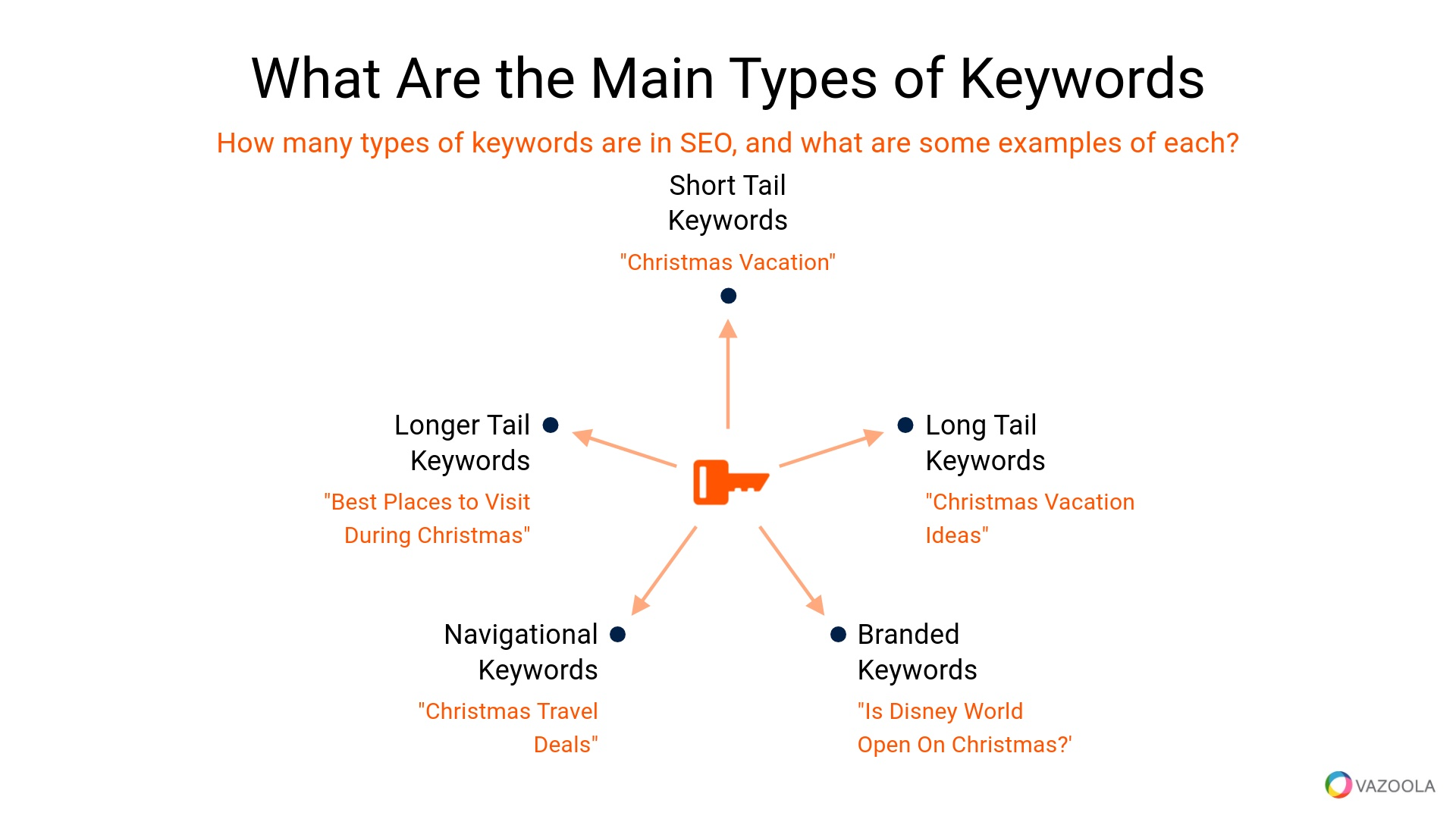
We’ve broken down some of the most common keyword types, along with keyword examples and their corresponding SEO keyword search volume (MSV) metrics. These include:
-
Short-Tail Keywords: Broad and general keywords, like, "Christmas vacation." (MSV 246,000).
-
Long-Tail Keywords: Specific phrases, such as, "Christmas vacation ideas." (MSV 20).
-
Longer-Tail Keywords: Hyper-focused queries, like, "best places to visit during Christmas." (MSV 6,600).
-
Navigational Keywords: Search terms used to find specific sites, such as, "Christmas travel deals." (MSV 390).
-
Branded Keywords: Product or service keywords including a brand name, like, "Is Disney World open on Christmas?" (MSV 1,600).
How to Search for Keywords Like an SEO Pro
Do you know how to search keywords?
Want to search for keywords like you’re some kind of SEO pro? Break your keyword research down into a set of tried-and-true phases that will put you on the road to successful search engine optimization.
Understand Your Target Audience
To research keywords starts with identifying your audience.
You can simplify the process by identifying their core pain points and how your offerings provide solutions. Understanding customer behavior insights helps you to develop a focused strategy.
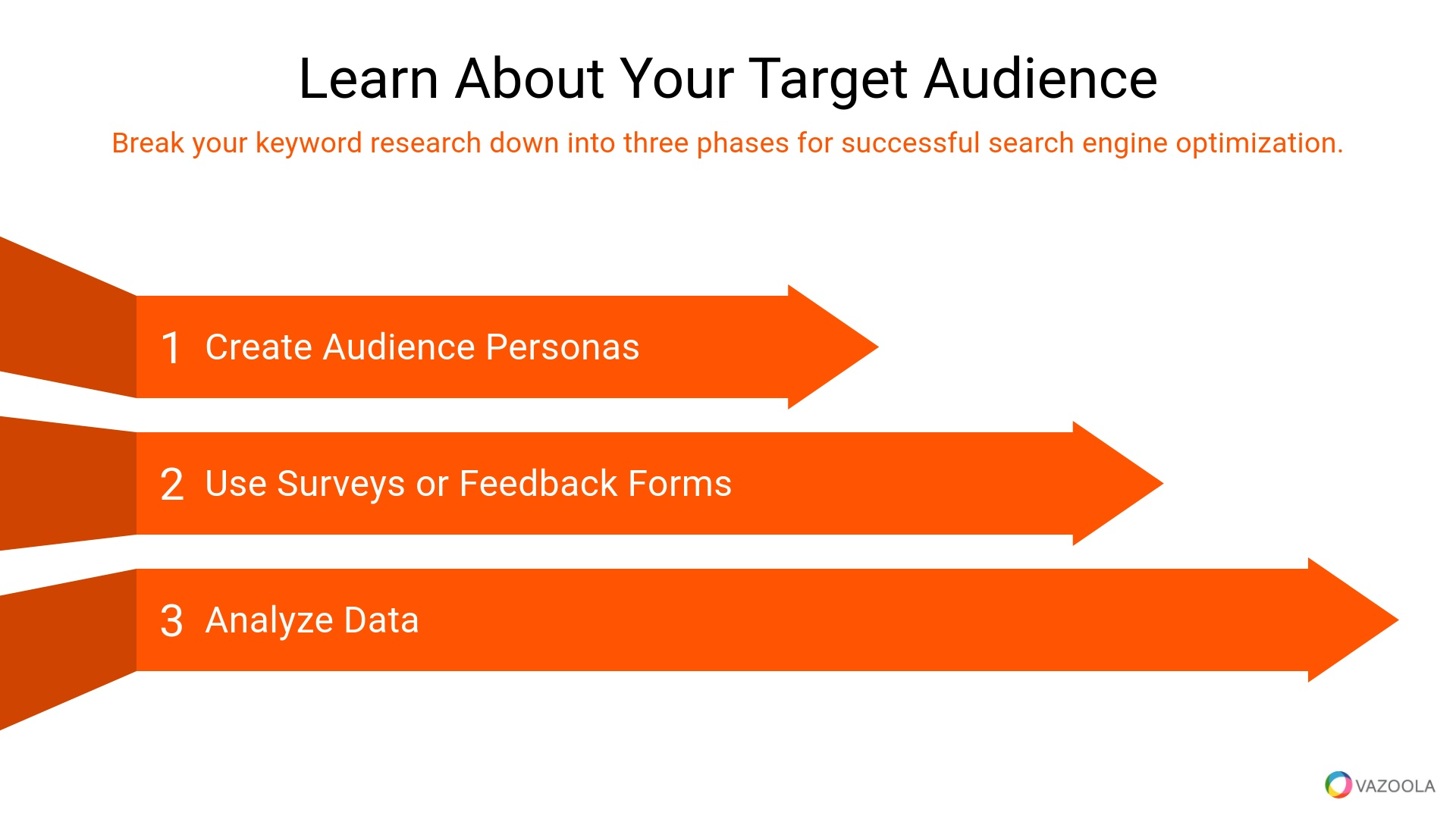
To help with the process, just follow three basic steps.
1. Create Audience Personas
Build detailed audience profiles. These should include data like demographics, interests, and challenges. For example, if your target audience includes small business owners, identify what tools or services help them manage and scale their companies.
2. Use Surveys or Feedback Forms
Want to know more about your audience? Why not just ask? You can use surveys or other feedback forms to ask specific questions about your audience's needs and preferences. Real-time data can help shape your greater content strategy.
3. Analyze Data
Data isn’t much good if it doesn’t lead to insights. Platforms like Google Analytics or social media insights provide a wealth of information about what content resonates with your audience. Use that data to align your keywords with user behavior.
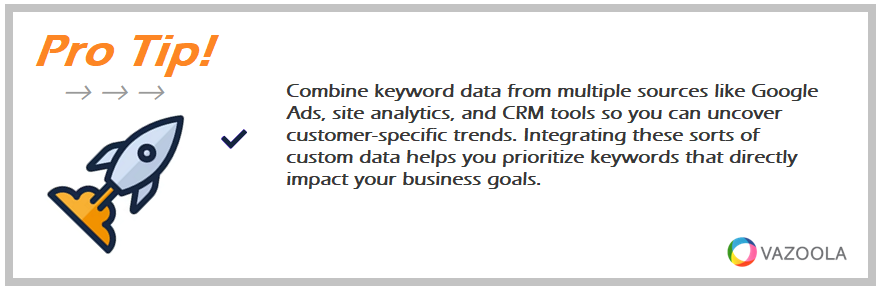
Combine keyword data from multiple sources like Google Ads, site analytics, and CRM tools so you can uncover customer-specific trends. Integrating these sorts of custom data helps you prioritize keywords that directly impact your business goals.
Focus on User Intent
What do users hope to accomplish from their searches?
For the best SEO keywords, your targets must align with the intent behind user searches. Understanding search intent means you’re categorizing queries into three main types: informational keywords, navigational, and transactional keywords. For examples of keywords:
-
Informational: Users seek answers or knowledge, such as, "How to optimize a blog post."
-
Navigational: Users aim to locate a specific website or brand, such as, "Google Keyword Planner login."
-
Transactional: Users are ready to take action, like, "buy keyword research tools."
When you match your content to these search intents, you help ensure your content is relevant to your audience. For instance, if a user searches for, “best SEO tools,” a comparative guide that highlights a transactional intent addresses their informational needs.
Check out our guide to search intent for a deeper dive.
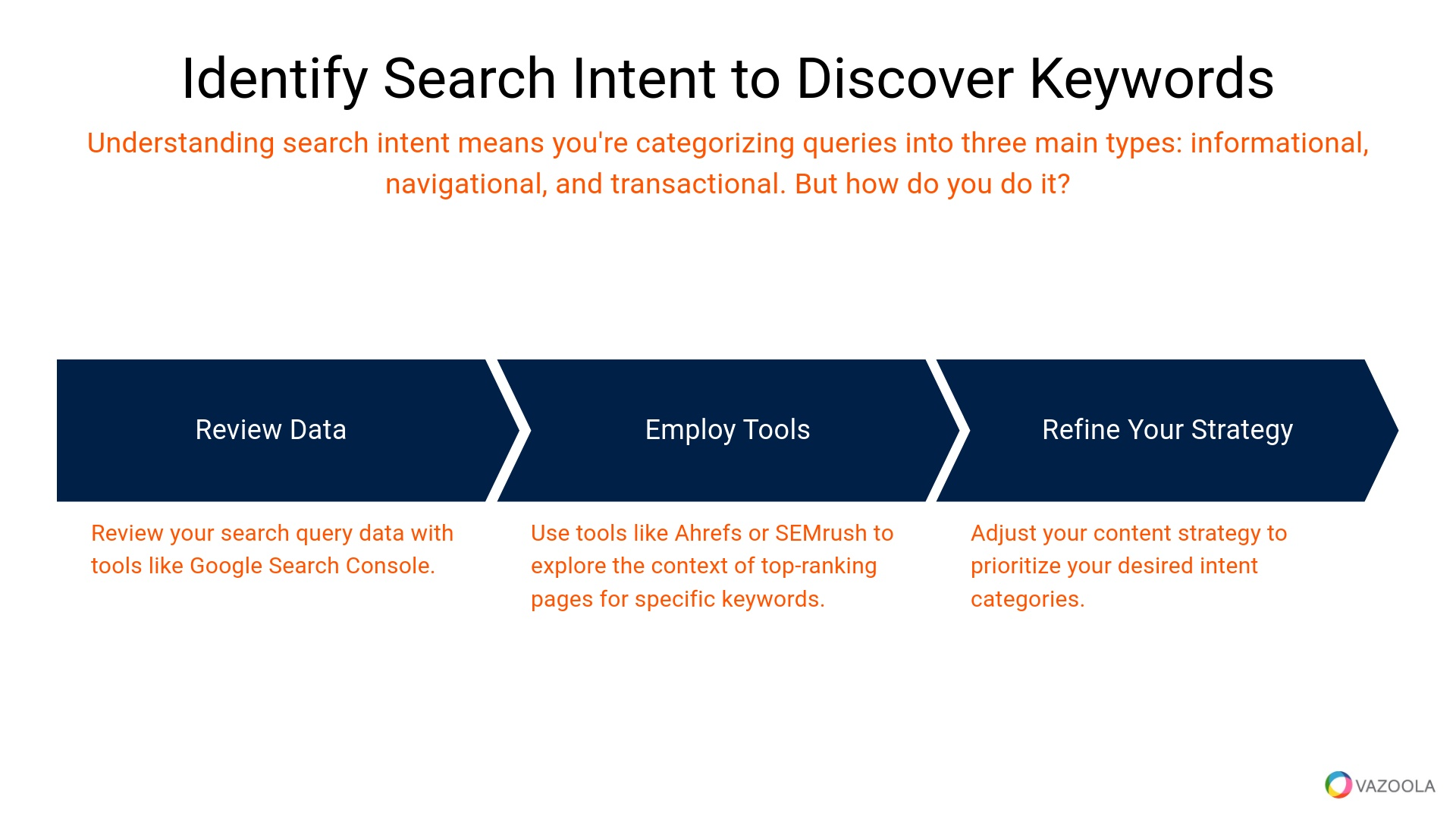
So, now that you understand the different types of search intent, what’s next? How can you tell the difference?
You can identify user intent by taking just a few actions.
1. Review Data
Review your search query data with tools like Google Search Console.
2. Employ Tools
Use other online tools like Ahrefs or SEMrush to explore the context of top-ranking pages for specific keywords.
3. Refine Your Strategy
Make sure you adjust your content strategy to prioritize your desired intent categories in every piece of content you create.
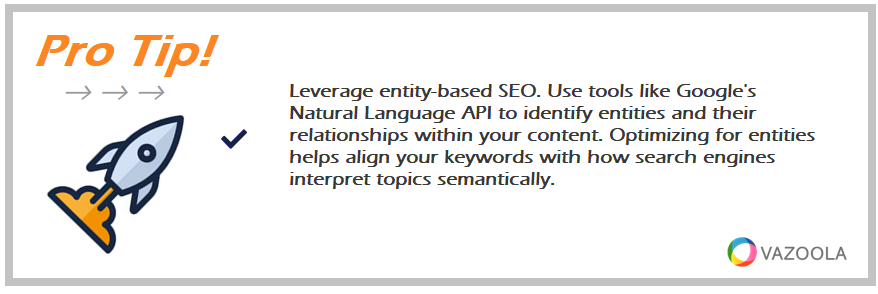
Leverage entity-based SEO. Use tools like Google's Natural Language API to identify entities and their relationships within your content. Optimizing for entities helps align your keywords with how search engines interpret topics semantically.
Prioritize Long-Tail Keywords
Which keywords are best to target? Why should you focus on long-tail keywords?
Long-tail keywords are generally less competitive, and they often reflect specific user needs. When you find niche keywords, you can target specific audiences effectively. Then you’ll be able to address more precise queries.
Examples of SEO keywords with long tails include, "eco-friendly packaging for small businesses," is far more specific than the basic, "packaging ideas."
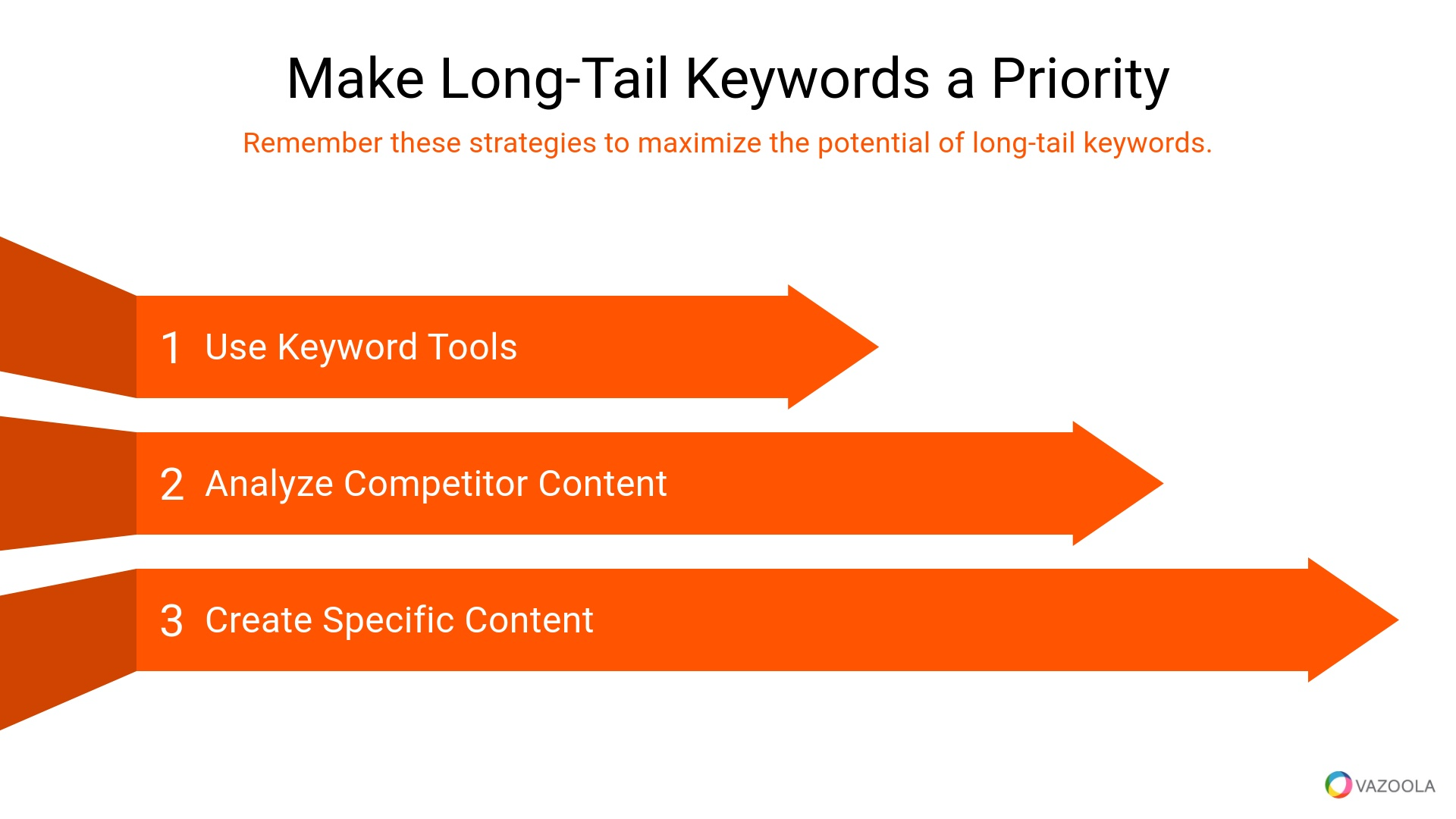
Remember these strategies to maximize the potential of long-tail keywords.
1. Use Keyword Tools
Platforms like SEMrush and Ubersuggest can help identify long-tail keywords based on your niche. Tools like SEMrush provide metrics like search volume, keyword difficulty, and related terms.
2. Reference Keyword Suggest
Google itself can be a good source for keyword ideas. Start typing a query relevant to your research and see what Google automatically suggests. These suggestions are chosen by Google based on a variety of factors such as relevance, popularity, and search volume.

3. Analyze Competitor Content
How do your competitors use long-tail keywords in their blogs and landing pages? You’re bound to get some ideas by analyzing their content.
4. Create Specific Content
Try to develop articles or guides that address your target keywords directly. For instance, a guide titled, "10 Tips for Choosing Eco-Friendly Packaging," targets a long-tail audience while also providing actionable advice.
Analyze Competitor Keyword Strategies
When you understand what works for competitors, the knowledge gives you actionable insights that enhance your own keyword strategy. Competitor keyword analysis tools like SEMrush allow you to uncover the keywords driving their traffic.
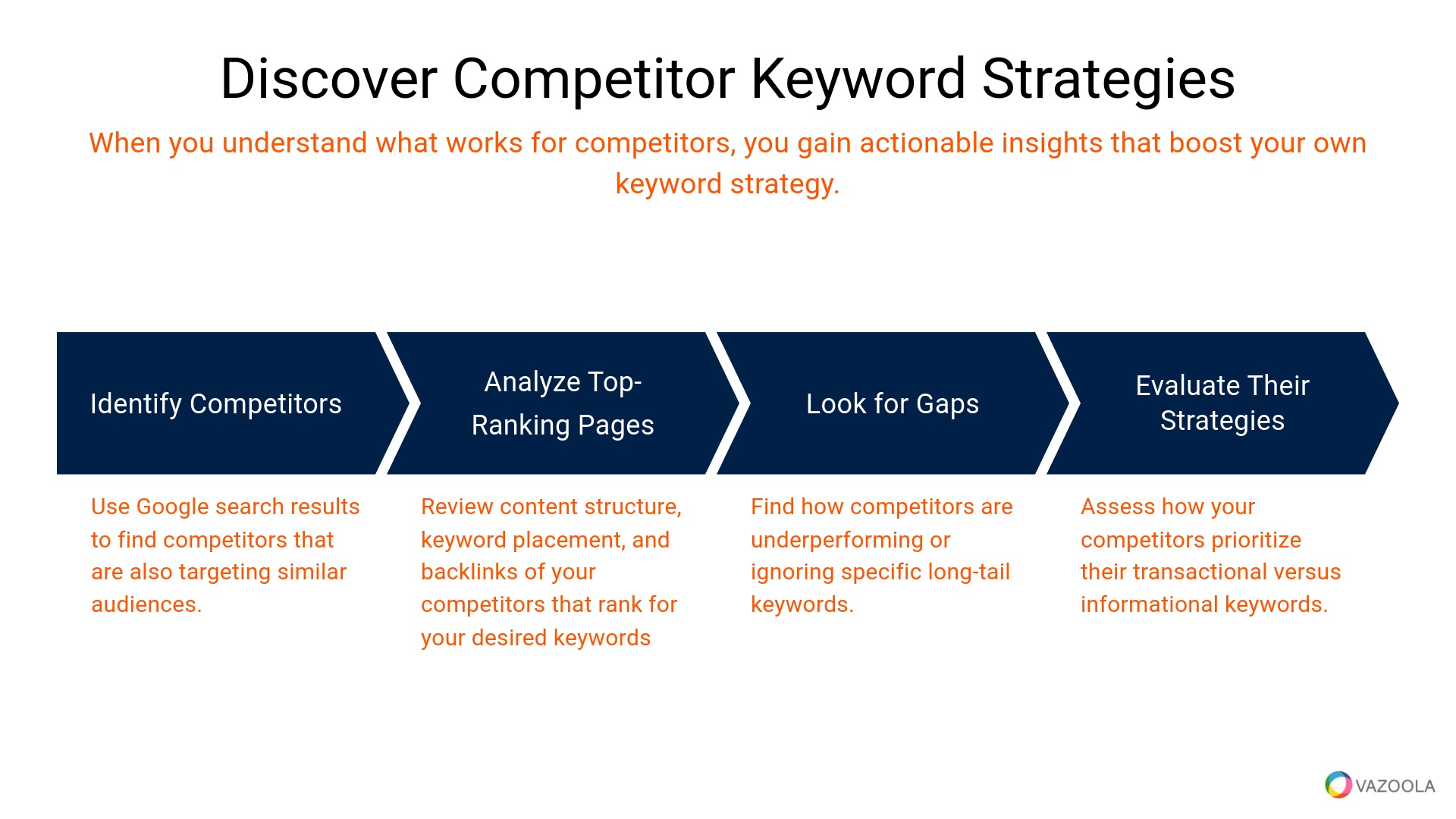
Just a few steps can help you analyze competitor strategies.
1. Identify Competitors
Use Google search results to find competitors that are also targeting similar audiences. Tools like SimilarWeb can provide plenty of helpful insights.
2. Analyze Top-Ranking Pages
Always review the content structure, keyword placement, and backlinks of your competitor pages that are ranking for your desired keywords. What are they doing that you can emulate?
3. Look for Gaps
Be sure and take the opportunity to find ways that competitors are underperforming or ignoring specific long-tail keywords. You can take advantage of these gaps in the market.
4. Evaluate Their Strategy
Finally, assess how your competitors prioritize their transactional versus informational keywords.
For example, if a competitor’s blog ranks for, "top SEO tools," you might consider creating a deeper, more detailed post that covers the same topic with unique insights.
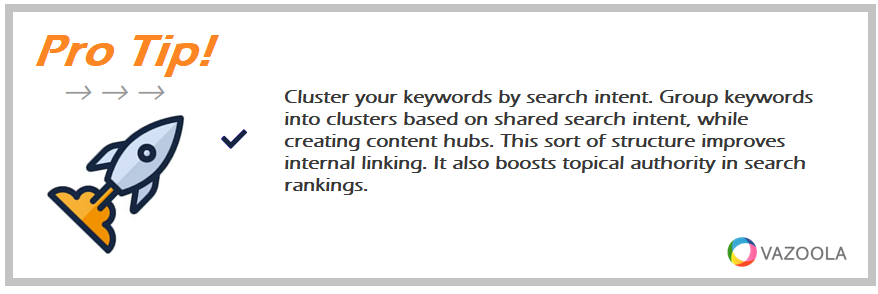
Cluster your keywords by search intent. Group keywords into clusters based on shared search intent, while creating content hubs. This sort of structure improves internal linking. It also boosts topical authority in search rankings.
Leverage Niche Forums for Fresh Keyword Ideas
Don’t forget niche forums!
Wait… what are niche forums, anyway?
Niche forums are an often-overlooked resource for discovering emerging topics and understanding audience interests. Platforms like Reddit and Quora are popular, but specialized tools like BoardReader can help you dive deeper into less mainstream discussions.
Forums are important to keyword research and SEO for a couple of reasons:
-
Emerging Trends: Forums often showcase topics that haven’t yet gained mainstream search volume. Identifying these topics helps you stay ahead of the curve.
-
Direct Audience Interaction: Forum discussions can also reveal specific pain points and questions from real users.

It’s easy enough to use forums for SEO keywords research. Just follow three steps to find SEO keywords.
1. Identify Relevant Forums
What forums are most relevant to your niche? Search for industry-specific communities beyond Reddit and Quora. BoardReader can simplify this process.
2. Extract Common Questions
What is your target audience asking about? Look for recurring themes or frequently asked questions.
3. Incorporate Topics
Once you’ve identified trending topics, you can use those insights to create unique content that addresses these emerging needs.
For example, if a forum discussion highlights confusion around, "how to use advanced Google search operators," that conversation could inspire a blog post or guide that answers users’ questions.
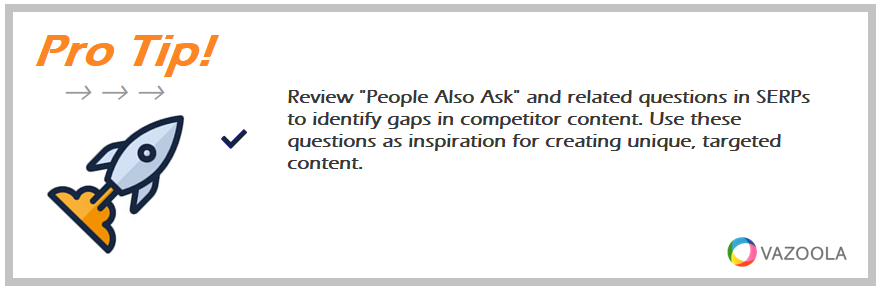
Review "People Also Ask" and related questions in SERPs to identify gaps in competitor content. Use these questions as inspiration for creating unique, targeted content.
Use Advanced Keyword Research Tools
Nowadays, you don’t have to do all your keyword research for SEO manually. Various online tools can simplify the keyword research process.
Advanced platforms like Google Keyword Planner, Ahrefs, and SEMrush provide critical data on search volume, competition, and trends.
Vazoola’s free Keyword Research Tool is another excellent option to refine your strategy.
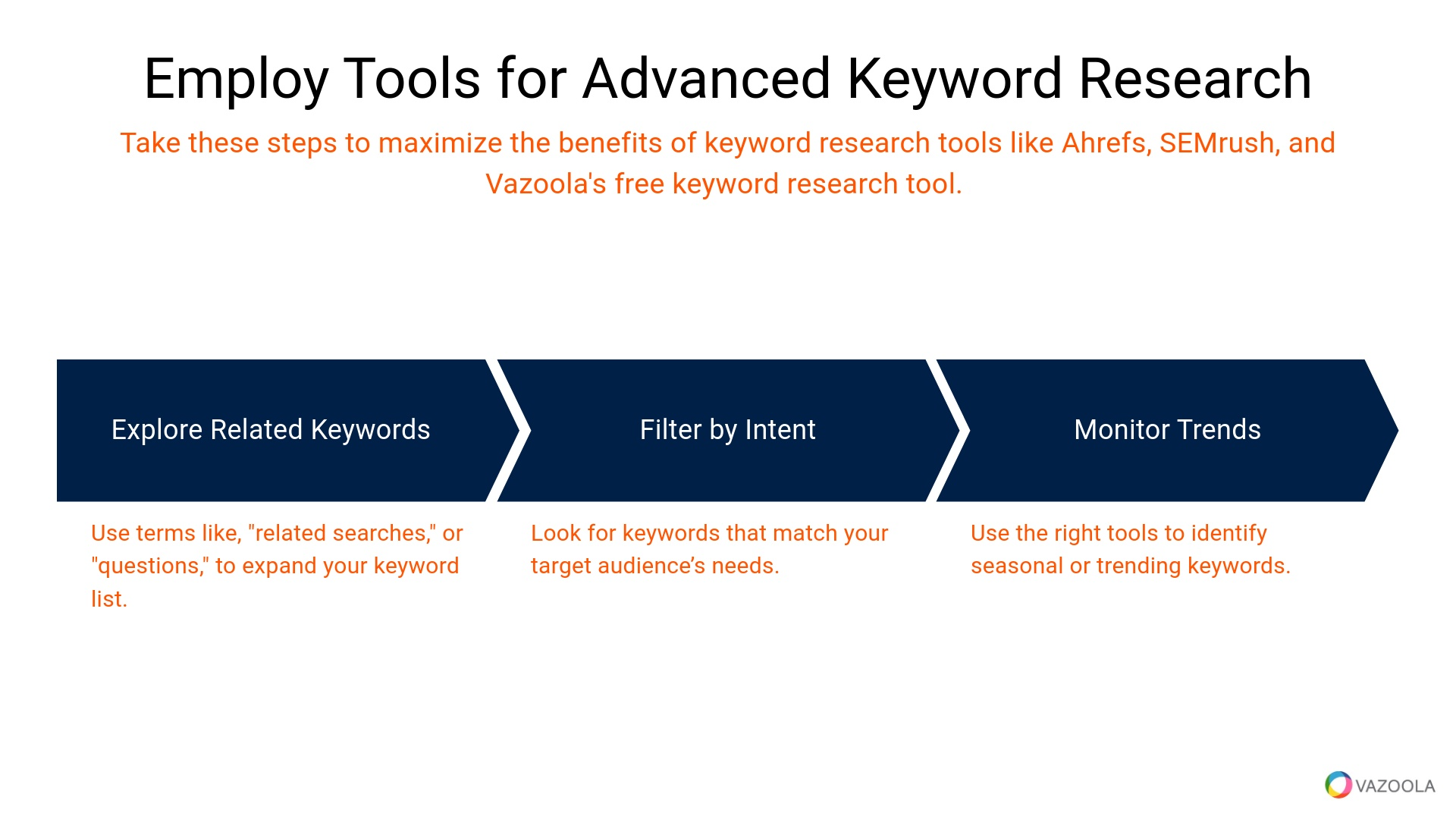
Take these steps to maximize the benefits of keyword research tools:
1. Explore Related Keywords
Don’t get tunnel vision when you’re conducting keyword research. Use terms like, "related searches," or "questions," to expand your keyword list.
2. Filter by Intent
What was the point of the search query? Look for keywords that match your target audience’s needs.
3. Monitor Trends
To keep up with the SEO Joneses, you need the right tools to identify seasonal or trending keywords. That way you can capitalize on timely opportunities.
For example, during the holiday season, a keyword like, "best Christmas gifts for eco-conscious shoppers," might see a spike in search volume. That makes it a valuable addition to your SEO strategy.
How to Choose the Right Keywords
Sure, finding keywords is one step. But choosing the right ones helps you achieve success.
Balance the data you find, your brand identity, and even your gut instinct when prioritizing keywords and content.

When you’re ready to choose the perfect keywords for your SEO campaigns, these five steps will help you along the way.
1. Analyze Data
Always use keyword rankings and search metrics to guide your decisions. Tools like Ahrefs and SEMrush provide detailed data on aspects like keyword difficulty, search volume, and competitiveness. They help you prioritize keywords effectively.
2. Emphasize Brand Keywords
As you already know, your brand is everything. Try to incorporate branded keywords for consistency. Aligning branding keywords with your brand identity helps your content resonate with your existing audience and even attract new users.
3. Recognize Opportunity
You might have plenty of tools to help you analyze your keywords, but you also want to engage your own brain to identify opportunities. Recognize emerging trends, even if the data is limited.
For instance, a new product category or industry innovation might offer untapped potential, even if it hasn't shown significant search volume yet. By positioning your content early, you can capitalize on these opportunities as they grow.
4. Conduct Competition Analysis
What’s the competition for your targeted keyword? Assess how challenging it would be to rank for a particular keyword. High competition may require a more targeted approach with long-tail keywords or niche content.
5. Align with Business Goals
Keywords should always support your overarching business objectives. Try to prioritize terms that drive traffic and conversions. They also should drive engagement relevant to your goals.

As visual search grows, especially on platforms like Pinterest and Google Lens, optimize content with descriptive, keyword-rich alt text and file names for images. That way, you’ll capture more visual search traffic.
Master Your Keyword Research Strategy
If you want to master keyword research, it’s going to require a few things, namely strategy, tools, and creativity.
By focusing on user intent, leveraging advanced tools, and tapping into niche forums, you can uncover opportunities that competitors might miss.
Remember, effective keyword selection isn’t just about search volume. It’s also about relevance, opportunity, and alignment with your SEO goals.
Start with optimizing your strategy today. Before you know it, you’ll unlock the potential of keyword research to drive more meaningful traffic and engagement. You’ll know how to find keywords for SEO like a whiz!
Now do you know how to choose SEO keywords? Do you know how to determine keywords for SEO? Did our keyword research guide help you learn how to do keyword research?
If you’re looking for expert assistance, Vazoola’s keyword services, tools and resources are here to help you achieve your goals.
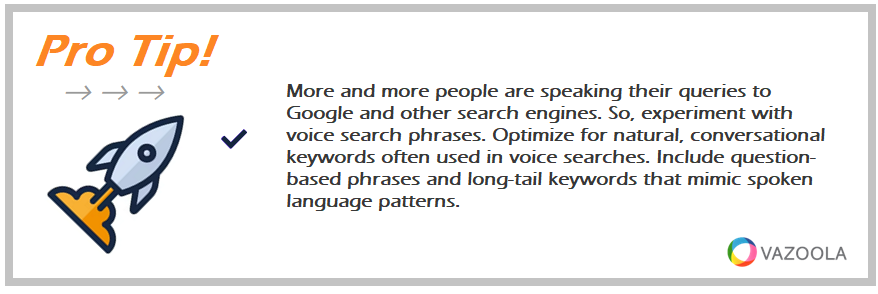
More and more people are speaking their queries to Google and other search engines. So, experiment with voice search phrases. Optimize for natural, conversational keywords often used in voice searches. Include question-based phrases and long-tail keywords that mimic spoken language patterns.

